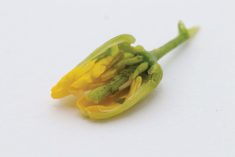Doyle Weibe, who farms near Saskatoon, Sask., is one western Canadian farmer who is ready with his sustainable farming certification when the expected demand to supply canola to the European Union (EU) biofuel market breaks.
With a poor crop in parts of the EU in 2019, Canadian grain marketers say there is potential for the demand this year for Prairie canola shipments to increase from the more usual 300,000 to 400,000 tonnes up to 1.2 to 1.5 million tonnes. Canadian canola growers need to be ready.
The bottom line during a Canola Council of Canada webinar in late August: Be ready to supply the EU market. Get your sustainable farm certification.
Read Also

Avoid these thought traps when investing
Investing for Fun and Profit: Let’s review a list, by renowned fund manager Peter Lynch, of the most dangerous things that stock market investors can say to themselves, or to others.
By all accounts receiving accreditation is not nearly as difficult as it sounds. Weibe says it was a very straight-forward process when he applied and received his first sustainable farming certification in 2017. Chad Molesky, merchandising manager with Viterra in Regina says, “it takes about five minutes.”
Western Canadian grain companies Viterra, G3 and Cargill are signing up farmers to supply canola to the EU biofuel market. “All a producer needs to do is stop in at any Viterra (or any of the three companies) facility across the country, check off an application that has five questions, and essentially they are certified,” says Molesky. “While there might be some exceptions, I would expect that virtually every canola grower in Western Canada would qualify.”
The process may also involve an audit by the certification body ISCC (International Sustainability and Carbon Certification). These audits are done on a random or sporadic basis. The audit was described much like “having a talk with someone in a coffee shop.” Again, a very painless process.
The need for certification
While the sustainable farm certification process has been around for some time, it has taken on new emphasis recently as trade issues with China have significantly interrupted/stopped Canadian canola shipments to that country, with no end to the ban in sight. The canola industry has been looking for alternate markets.
The EU biofuel industry is presenting itself as a potential market opportunity, but as pointed out by Brian Innes, vice-president of public affairs with the Canola Council of Canada (CCC), EU policy requires that all feedstock used to produce biofuel must be certified sustainable.
“The EU opportunity is something we have been watching for some time and it is growing in a vast way,” says Molesky. Much of the EU diesel fuel is biodiesel produced from oilseed crops. The EU normally produces about 21 million tonnes of oilseed, but due to production problems EU production is expected to be reduced to about 17 million tonnes in 2019. While exports from other regions such as Ukraine, the Black Sea and Australia could make up the shortfall, Canada stands as a “very affordable source” to supply this market, provided the canola comes from certified sustainable farms. “Because of our supply issue unfortunately prices have declined, which isn’t good news for growers,” says Molesky. “But does improve our position in the marketplace.”
On the ground
Doyle Wiebe, who crops about 6,200 acres of grains, oilseeds and pulses on his Langham-area farm just northwest of Saskatoon, says he applied for sustainable farm certification to improve marketing opportunities for all crops.
“When I applied (in 2017) I wasn’t thinking about canola,” says Wiebe who is also a CCC director. “I just wanted to be prepared if an opportunity came along to market any of my crops into the EU.”
Weibe who completed an environmental farm plan a few years ago says he has long been interested in understanding and complying with the protocols and procedures that may be required to access different markets. It all helps in marketing crops.
He had earlier been involved with a project looking at providing sustainable farming certification, but that program involved a fairly complicated and involved questionnaire for certification. He was surprised when the ISCC process was so simple.
ISCC is an international agency working with dozens of countries and companies around the world to provide sustainable farming accreditation for a wide range of crops include rapeseed/canola, palm oil, corn, wheat, sunflower, and soybean to name a few. All commodities are used in the production of food, energy, feed and bio-based materials.
“When I signed up for the International Sustainability and Carbon Certification (ISCC) program through Viterra, I was surprised how they had distilled their qualifications down to just five or six questions,” says Wiebe. “For example, ‘Have you taken out any trees over the past five years?’ The form took about two minutes to fill in.”
Weibe says while it was easy to get approved in 2017, so far there hasn’t been a specific call for any commodities to supply the EU market. However, Molesky says that may change this year.
Weibe says farmers may be a bit reluctant to sign up for certification because they may not fully understand what it means, they may think it is an involved or complicated process, and/or they are wondering if there is any benefit. “I think once there is a call for product and producers can see a price being offered, in some cases perhaps a premium price, producers will see it as something real and not just hypothetical.”
Wiebe says for his own farm he wants to keep all doors open for marketing opportunities. “Over time, I’m not sure what the advantage is going to be, but it could mean the difference between being able to sell and not being able to sell,” he says.
“In the bigger picture, by participating it helps us tell our story to consumers. Farmers on the Canadian Prairies have one of the best sustainability stories to tell. We have one of the most sustainable crop rotations in the world, with a variety of oilseeds, pulses and cereals available to us.
“Widespread adoption of conservation tillage makes us good soil and energy stewards,” says Wiebe. “And we abide by the laws of the land, which set high standards for employees and for air, soil and water quality.”
EU certification: The five basic areas of interest
Farmers interested in signing up for accreditation to sell products into the European Union will find it a simple and free process.
Chad Molesky, merchandising manager with Viterra in Regina says receiving sustainable farm certification is as simple as walking into the office of any of the exporting companies (any elevator location), completing and signing a five-question form about your farming operation.
- The five questions ask about: Field size, location, legal status, etc.
- Land conversion from forest since January 1, 2008 (basically, have you cleared trees off more than a hectare of land for crop production since 2008).
- Land conversion from high biodiversity value, high carbon stock or peat land since January 1, 2008.
- Environmentally responsible production including factors such as water management, soil conservation, disposal of fertilizer and pesticides.
- Ensuring that plant protection products are used and stored in a safe and environmentally responsible manner.
The process basically involves saying “yes” to proper and sustainable production practices, but producers don’t need to list or go into detail with the specifics of the practices when completing declaration forms at their local elevator.
Molesky clarified further by email: “the land conversion clause is intended to ensure that natural grasslands, designated parklands and wetlands saturated with water for significant portions annually are protected. Slough areas that vary from year to year would typically not be considered an issue. We encourage farmers to contact our customer account
reps for more information on whether their land meets the ISCC’s program requirements.”
In the event of an audit (which can happen at random) a producer may need to provide documentation or records verifying their compliance. More details of the support information or documents that may be required are available on the Canola Council of Canada website.
















